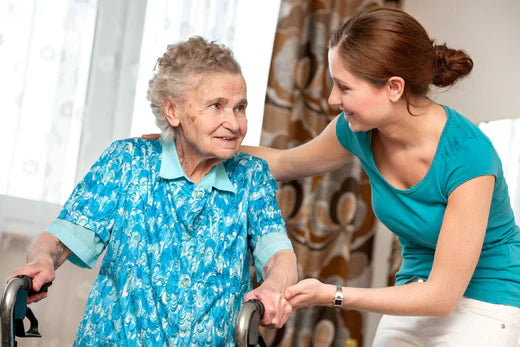Dementia and Falls Risk
Dementia and Falls Risk
Alzheimer's and Dementia affects millions of people worldwide. As individuals age and face cognitive challenges, they become more vulnerable to various health risks, one of the most concerning being falls. Falls can have severe consequences, especially for those with dementia, and it's essential to understand the connection between dementia and falls risk to develop effective preventive measures.
Cognitive Impairment and Balance Issues
Dementia often results in cognitive decline and motor skill impairment, affecting balance, coordination, and spatial awareness. Individuals with dementia may struggle to process sensory input and coordinate movements, making them prone to stumbles and falls.
Medications and Dizziness
Many individuals with dementia are prescribed medications to manage symptoms. Some of these medications can cause dizziness, lightheadedness, or a drop in blood pressure, further increasing the risk of falls.
Environmental Factors
The home environment plays a crucial role in falls risk for those with dementia. Cluttered spaces, poor lighting, uneven flooring, and lack of grab bars or handrails can significantly increase the risk of falls.
Alarming Statistics
According to the World Health Organization (WHO), falls are the second leading cause of accidental or unintentional injury deaths worldwide. Among older adults, those with dementia face an even higher risk. Studies have shown that people with dementia are three times more likely to experience a fall and four times more likely to suffer a fall-related fracture.
Preventive Measures
Regular Exercise
Incorporating physical activities and exercises that improve balance, strength, and mobility can significantly reduce falls risk. Simple routines like walking, chair exercises, or tai chi can be beneficial.
Home Modifications
Adapting the living environment to be safe and supportive for individuals with dementia is crucial. This includes installing handrails, improving lighting, removing clutter, and using non-slip mats. Hip protectors are a safe and easy intervention to help keep hips protected should a fall occur.
Medication Review
Regular medication reviews by healthcare professionals can help identify and adjust medications that may cause dizziness or unsteadiness, minimizing the risk of falls.
Cognitive Training
Engaging in cognitive training exercises and activities to enhance mental alertness and cognitive function can indirectly contribute to better spatial awareness and potentially reduce falls.
Supervision and Support
Providing supervision or assistance, especially in hazardous areas or during activities that pose a risk, can prevent falls and injuries.
The Role of Caregivers and Healthcare Professionals
Caregivers and healthcare professionals play a vital role in mitigating the risk of falls among individuals with dementia. They need to be educated about the specific risks associated with dementia and falls, enabling them to implement preventive measures and provide appropriate care.
Falls pose a significant threat to the health and well-being of individuals with dementia. Understanding the interplay of cognitive decline, medication effects, and environmental factors is essential to develop effective preventive strategies. By implementing appropriate interventions and creating a safe living environment, we can significantly reduce the risk of falls and enhance the quality of life for those living with dementia. Early identification, education, and proactive measures are key to addressing this critical health concern and ensuring a safer, supportive, and empowering environment for individuals with dementia.

